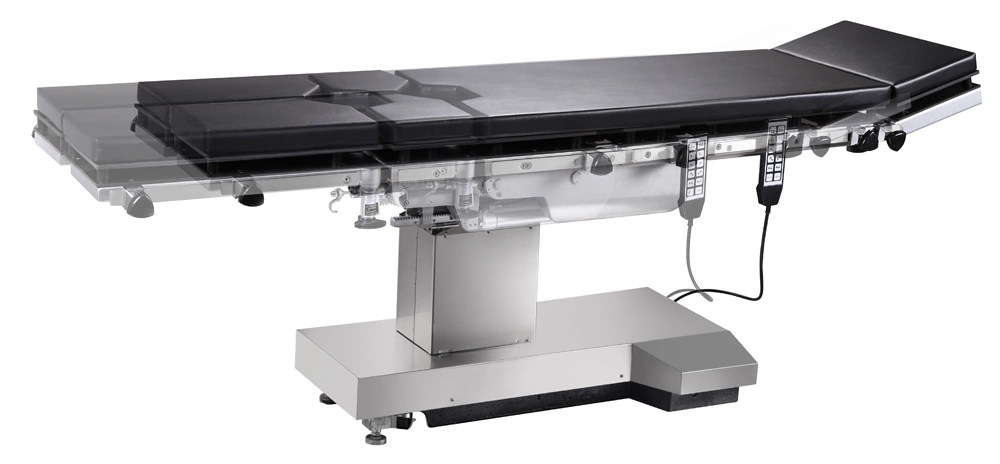The operating table is an indispensable equipment in the hospital operating room, which directly affects the safety of surgery and the operational efficiency of the surgeon. The selection and application of surface materials for operating tables have a crucial impact on their functionality and hygiene quality. When selecting the surface material of the operating table, consideration should be given to its antibacterial, stain resistance, slip resistance, and corrosion resistance. Next, we will talk about the selection and application of surface materials for the operating table.
Firstly, the selection of surgical table surface materials should consider their antibacterial properties. The operating room is a highly disinfected and sterile place, so the antibacterial performance of the surface materials of the operating table is very important. During the surgery, infection at the surgical site may worsen the patient's condition and even endanger their life. Therefore, the selection of surface materials for the operating table is very important. Stainless steel is currently the most commonly used material. Stainless steel has good antibacterial properties, a smooth surface without pores, and is easy to clean and disinfect, making it the preferred surface material for operating tables.
In addition, some new materials, such as silver ion antibacterial materials and zinc oxide antibacterial materials, have also begun to be applied in the manufacturing of surgical table surface materials. These materials have better antibacterial properties and can better ensure the hygiene quality of the operating room.
Secondly, the selection of surface materials for the operating table should consider its stain resistance. During the surgery process, a large amount of dirt such as blood and body fluids will be generated. If the surface material of the operating table does not have good stain resistance, it will affect the progress of the surgery. Therefore, the selection of surface materials for the operating table should have strong anti fouling performance, and the surface should be smooth, non porous, and easy to clean and disinfect. In addition to the anti fouling performance of the material itself, the design of the surface material of the operating table should also consider its ability to block dirt. Some surgical table surface materials, such as plastic and glass, have low surface flatness and are prone to forming small pores or protrusions on the surface, making it difficult to thoroughly clean due to the retention of dirt. And some new materials, such as quartz bricks, have a smooth surface, no pores, and are easy to clean and disinfect, which can effectively block dirt.
Furthermore, the selection of surface materials for operating tables should take into account their anti slip properties. During the surgical process, surgeons and nurses need to move frequently on the operating table, so the anti slip properties of the surface materials of the operating table are very important. The surface material of the operating table should have good anti slip performance, which can reduce accidental injuries during the surgical process. At present, the commonly used surface materials for operating tables include stainless steel, quartz bricks, glass, and ceramics. Stainless steel is the most commonly used material, with good antibacterial and stain resistance, as well as a smooth surface that is easy to clean and disinfect. Quartz bricks have good anti fouling and anti slip properties, but their prices are relatively high. Glass and ceramics have good antibacterial properties, but their corrosion resistance is poor and they are easily corroded by chemical disinfectants. Therefore, careful consideration should be given when selecting surface materials for operating tables.
It is important to consider the corrosion resistance when selecting the surface material of the operating table. The surface material of the operating table needs to have good corrosion resistance due to long-term disinfection, cleaning, and other treatments. Some surface materials, such as glass and ceramics, although they have good antibacterial properties, have poor corrosion resistance and are easily corroded by chemical disinfectants. Therefore, careful consideration should be given when selecting surface materials for operating tables.
In summary, the selection of surgical table surface materials should be comprehensively considered based on their antibacterial, stain resistance, slip resistance, and corrosion resistance. At present, stainless steel is the most commonly used surgical table surface material, which has good antibacterial and anti fouling properties, and is easy to clean and disinfect. When using the operating table, it is necessary to strengthen maintenance and management, regularly inspect and repair the surface materials of the operating table, to ensure the hygiene quality and service life of the operating table.
Article SourceSAKAMITI-https://www.sakamiti.com/2099.html
文章末尾固定信息


